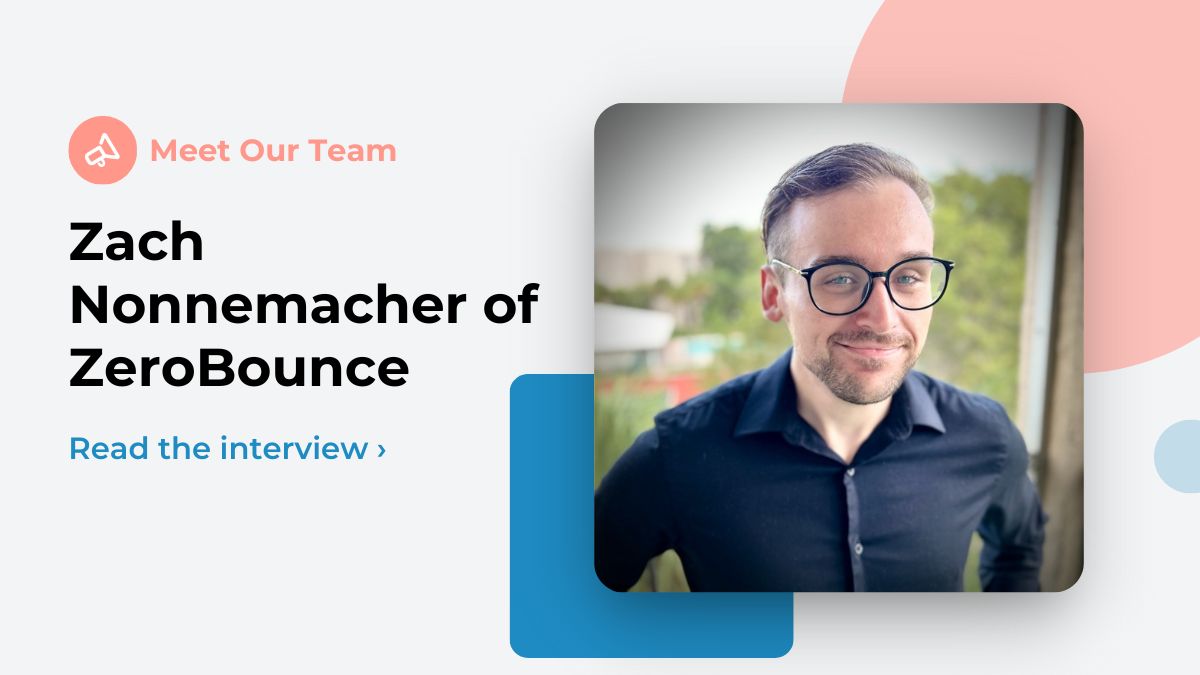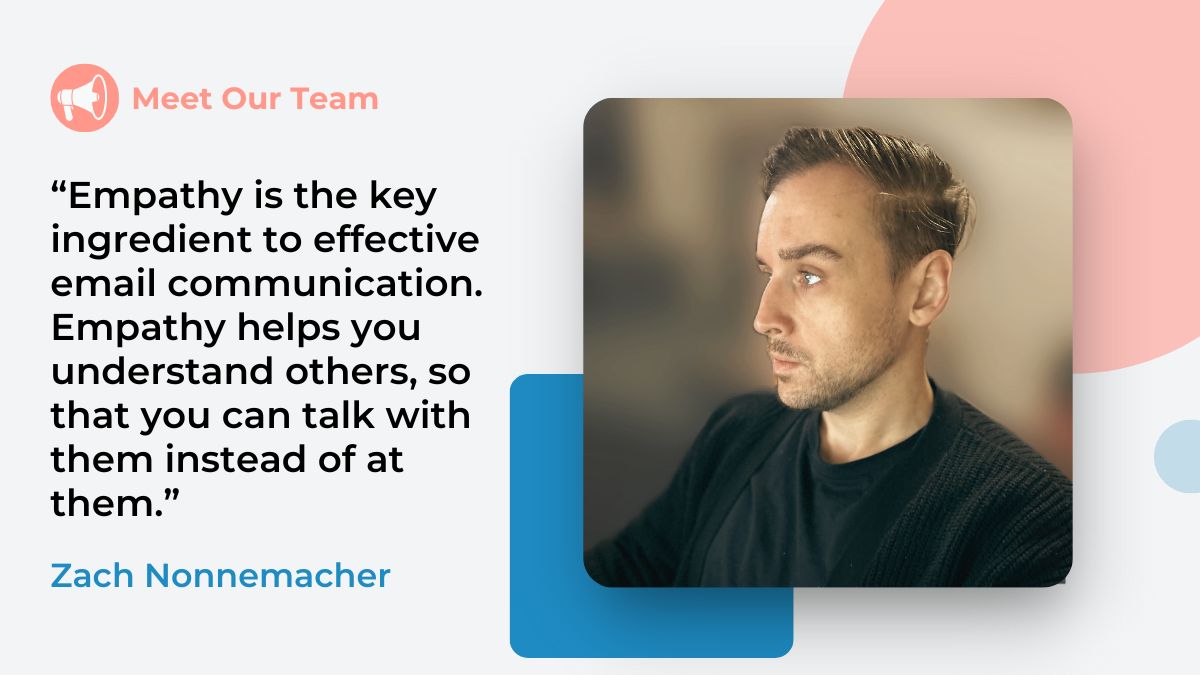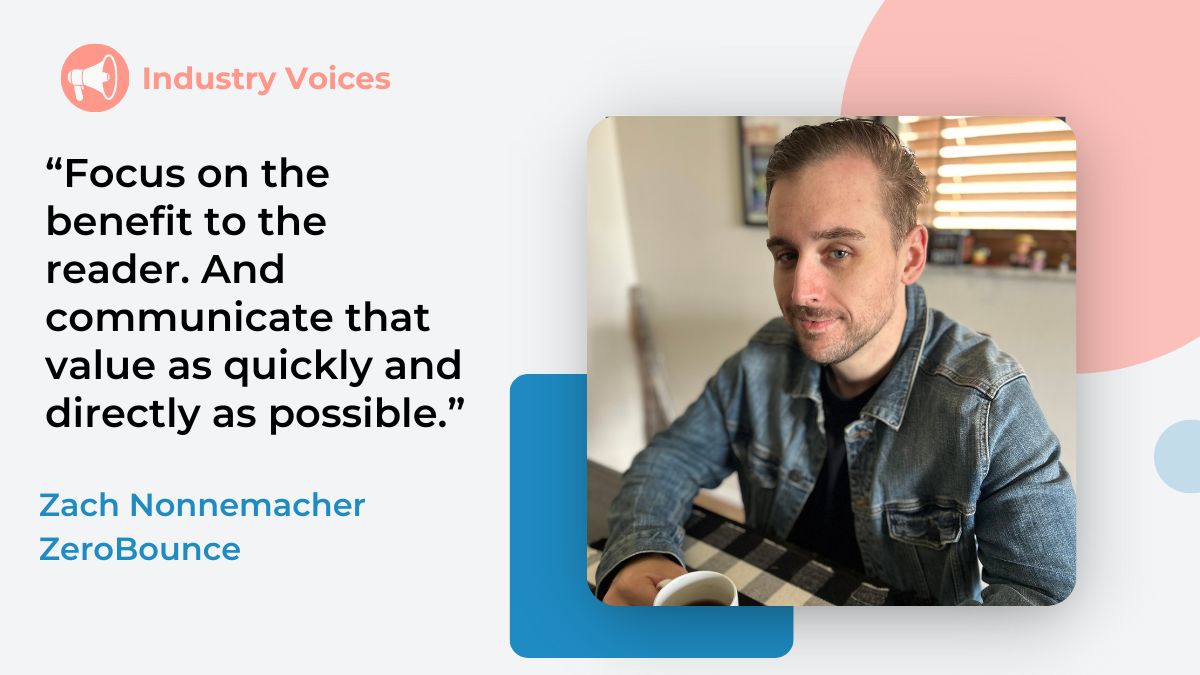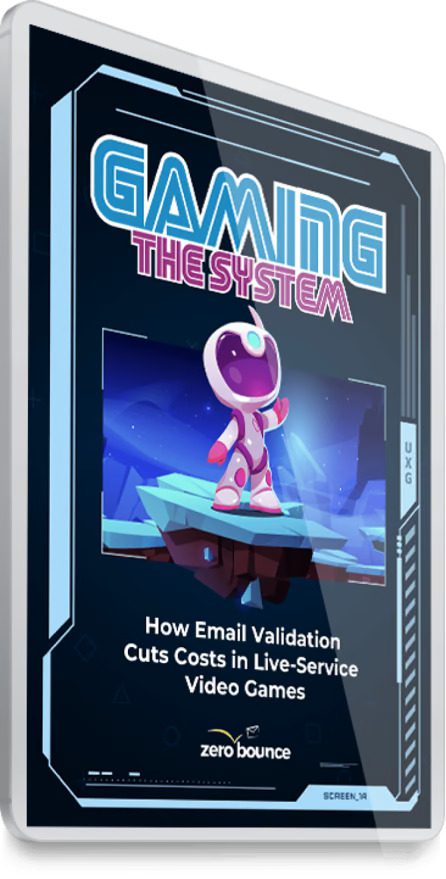
Zach Nonnemacher, ZeroBounce: Empathy is the Key to Effective Email Copy
Empathy. It’s such a key to our relationships with others – and ourselves. As our Content Manager Zach Nonnemacher found, it’s also a critical ingredient to effective email copy.
Since joining ZeroBounce, Zach has written over TEN MILLION words for our website, blog, ads, and email campaigns. He’s tested countless marketing strategies and copywriting formulas.
We wondered what ideas he might have percolating in his brain that you could apply to your writing and boost your email copy.
He popped in to discuss:
- The number one email marketing rule.
- What to do when it feels like you cannot write another word.
- Three things you could start today to improve your email results.
Zach, what do you find makes for the most effective email copy?
The most important thing to keep in mind when writing an email is this: what’s in it for the reader/customer?
It’s easy to get carried away in the excitement of your own product, along with all the bells and whistles. People want to know the bottom line – what’s the message about, and how does it benefit them?
I see the sentiment a lot that readers “don’t care.” But it’s not that simple (after all, they chose to subscribe to you, right?) I feel it’s more about the idea that from the moment we turn on a phone or open a laptop, we’re bombarded with messages from coworkers, advertisers, friends, etc. It’s hard to sift through everything day after day.
Empathy is the key ingredient to effective email communication. Empathy helps you understand others, so that you can talk with them instead of at them.
In short, focus on the benefit to the reader. And communicate that value as quickly and directly as possible.

What is the number one email marketing rule?
Treating your readers like individuals. Starting from a place of empathy is great for copywriting (or general communication).
If you listen to many email copywriters, you’ll find similar strategy recommendations again and again: segment your lists, tailor the message to the audience, etc. These are tried and true tactics that all circle back to placing value on the individual.
Think about it like making a recommendation to a friend. You don’t turn into a robot and begin listing facts and figures to explain why they need something. You listen to their problems, understand their pain point, and use that to match their problem to a potential solution.
You’ve written quite a lot of copy. In fact, you’re a content monster! Has there been a greatest writing teacher for you?
I kind of have a funny answer for this one. While many individuals have helped me work on my writing for website copy, emails, etc., I always think of one of my high school English teachers, Laurie Marshall.
The reason for this, I suppose, is that I grew up in a troubled home environment and didn’t necessarily have a lot of drive at that young age. I was on the basic English track and went through class without much effort. But, instead of leaving well enough alone, she was the only teacher I remember who was actively involved with students and cared enough to push my abilities.
That alone motivated me to keep challenging myself with advanced courses. I also took a variety of voluntary writing and literature courses in college.
I’m sure if you ask copywriters this question, they’re likely to cite a variety of accomplished marketing or sales folk. But, I don’t see myself where I am had I not been pushed in this direction.

Anyone who has to write a lot knows that, eventually, a writer has to come to terms with being human. You can only do so much! What do you do when it feels like you can’t write another word?
It made me feel so much better as I got further into my career and met other writers who did, in fact, feel this way. Early on, I was more machine-like than human, as I needed to accomplish tasks.
But this is why I really work hard to create a work mindset in which I have the time for moments like these. Anyone who writes can relate to those times when you don’t have a choice and you just need to get something out. It’s never a great feeling, and you’re pretty certain you could do better.
With that, I just walk away when I can. Go get some exercise, or preoccupy my brain with something unrelated. Nearly 100% of the time, whatever writing task you were stuck on will become so much clearer. And I have to stress – it’s important to do this.
I’ve mentioned earlier that relating to others and showing empathy is the ticket for stronger copy. And, if you’re feeling drained or detached, it will show in what you write.

Do you have any pet peeves as a writer?
Honestly, I don’t think I have many, as I try to show a lot of grace when it comes to writing or making mistakes. We’ve all been there.
However, I would strongly prefer everyone to use the Oxford comma (haha). If not, can we at least pick one style and stay consistent?
Then again, if we got into it about all of the inconsistent rules in the English language, we’d be here all day.
Anyone who begins working at ZeroBounce comes to learn more about email than they ever dreamed possible. What has been the most surprising thing you’ve learned about email?
This will sound like an ad insert for our product (haha). But, I would say the most surprising thing I’ve learned is just how swiftly a company can completely ruin its ability to deliver good emails in almost no time. Plus, the threat to your deliverability comes from different places.
And we’ve seen it happen even with huge names.
I remember seeing that story last year with JPMorgan thinking it had purchased around 4 million accounts, just for ¾ of those emails to bounce. When you’ve got a standard for bounce rates being as low as 2%, it takes one email campaign to cause a serious problem. And that’s not even getting into the topic of email security and how easily someone can spoof your domain.
With that said, it’s been pretty cool to work for someone like ZeroBounce, where we all get to play an active role in helping other businesses improve in terms of email.
What are your favorite email newsletters? Why?
I’m checking my personal mailbox…
- SubjectLine.com – Just great ideas for subject lines, open rates, and other geeky email stuff.
- MarketingProfs – A must-follow resource for a variety of marketing content and ideas. I appreciate the table of contents in every email!
- Critical Role – For a personal interest (but hey, that’s what all email subscriptions are supposed to be!) Critical Role is a group of professional voice actors and friends that livestream their game. Once a week, a good news summary and a cheat code with always-excellent artwork.
- Guitar World – I don’t play much anymore, but I still love keeping in touch with that world when I can.
- Daily Bandcamp – A newer one that was shared with me for music recommendations. It doesn’t always hit, but I still love the idea of sharing new artists with the world regularly.
Give us three things we can do today to improve our email marketing results.
#1. Segment your email list
A message created for a specific audience (especially if it’s about a specific product, offer, or event that the person has a connection to) will always perform better than a mass email.
#2. Have fun with your subject lines
I try to play around with new ideas often. If something doesn’t hit, don’t take it personally. If you’re a better comedian than I, don’t underestimate laughter. I stay subscribed to some newsletters just because their subject lines can make me laugh.
#3. Pay close attention to performance
Let your audience guide you as to what works. When you think about your favorite newsletters, you naturally engage just because you’re interested. If your content isn’t generating a buzz, try to generate new ideas to break the monotony. You can also send out a survey asking your readers what type of content they’d like to see and segment your list further based on their responses.
You wrote an ebook entitled “Gaming the System.” What inspired that? What was the most inspiring thing you learned?
I’d be lying if I said I didn’t immensely enjoy merging a private passion with a professional one. However, the inspiration came from learning how ZeroBounce’s services have helped real video game developers.
Much of what we talk about is catered to the email marketing space. However, I know from experience that more and more game companies are collecting user data by asking players to create accounts. That’s not unlike a SaaS provider or e-commerce store that would require users to make accounts with a valid email address.
In my experience, the difference is that many professionals are still ignorant of just how profitable video gaming is – regardless of how you feel about the hobby.
And there are a few things that stand out to me with these gaming companies:
1 – Many of the most profitable games with the highest player counts are free-to-play. They rely on microtransactions (or small purchases) to keep the game afloat. Since players use an email to sign in, email marketing becomes a great way to encourage microtransactions.
2 – Depending on the game, there are tens if not hundreds of millions of accounts. Since many are free to download and try, you can expect that a significant portion of these are no longer in use. Without a way to verify which emails are valid, these companies are sending emails doomed to bounce and paying to store junk data.
We talked about how being human when writing is critical. Though email validation is essential for any business sending mass emails, the gaming space is often overlooked and can tremendously benefit from email validation and security.
I wanted to do my part, however small, to speak more passionately about how those teams can benefit from cleaner email databases.

Quick questions for Zach Nonnemacher:
What’s the part of your job you enjoy the most?
I love that I get to write about a platform that is both genuinely of high quality and of high importance to anyone looking to improve their email campaigns. It’s just my job to try and reach those people.
Best way to boost your open rates:
In my experience, it’s email list segmentation.
That’s not to say compelling or funny subject lines aren’t great. But it’s genuinely hard to beat getting the right message to the right audience at the right time. Plus, it’s easier to write an email when you know exactly who you’re writing for.
A grammar rule you always stick to:
No comma splicing.
A grammar rule you don’t mind breaking:
Starting a sentence with a conjunction. Everyone’s taught that it’s unacceptable, but it’s often a great way to link thoughts and keep the reader engaged.
The best way to grow an email list:
Create great, relevant content even outside of email. We’ve been working hard to put together helpful guides with more specific, targeted content for a variety of different search and use cases. Webinars and Q&As are also effective. Just be sure to let readers know they’re also signing up for your newsletter.
I like these lead-gen strategies as they give future readers an idea of what kind of content they can expect. You don’t just want a high quantity of email addresses, you want readers who like your content and will engage with it.
If you could email anyone in the world. Anyone alive today, who would it be?
Composer Nobuo Uematsu – just to tell him thank you for making music that’s helped me get through every day since I was a kid.
What is your favorite place to write:
Honestly, just at my desk, in my room, and headphones on. It’s the only way I stay focused and on-task.
Table of Contents
- Zach, what do you find makes for the most effective email copy?
- What is the number one email marketing rule?
- You’ve written quite a lot of copy. In fact, you’re a content monster! Has there been a greatest writing teacher for you?
- Anyone who has to write a lot knows that, eventually, a writer has to come to terms with being human. You can only do so much! What do you do when it feels like you can’t write another word?
- Do you have any pet peeves as a writer?
- Anyone who begins working at ZeroBounce comes to learn more about email than they ever dreamed possible. What has been the most surprising thing you’ve learned about email?
- What are your favorite email newsletters? Why?
- Give us three things we can do today to improve our email marketing results.
- #1. Segment your email list
- #2. Have fun with your subject lines
- #3. Pay close attention to performance
- You wrote an ebook entitled “Gaming the System.” What inspired that? What was the most inspiring thing you learned?
- Quick questions for Zach Nonnemacher:
- What's the part of your job you enjoy the most?
- Best way to boost your open rates:
- A grammar rule you always stick to:
- A grammar rule you don’t mind breaking:
- The best way to grow an email list:
- If you could email anyone in the world. Anyone alive today, who would it be?
- What is your favorite place to write:






